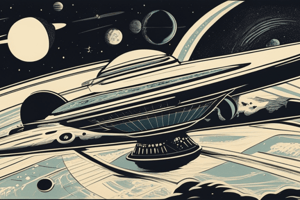Podcast
Questions and Answers
What are comets primarily made of?
What are comets primarily made of?
- Lava and dust
- Ice and rock (correct)
- Sand and water
- Metal and gas
Which planet in our solar system has a ring system?
Which planet in our solar system has a ring system?
- Neptune
- Venus
- Jupiter (correct)
- Mercury
What do moons contribute to in their orbital paths?
What do moons contribute to in their orbital paths?
- Shape of the moon
- Atmosphere only
- Temperature regulation
- Mass and atmosphere (correct)
What is the primary focus of space exploration?
What is the primary focus of space exploration?
Where are some comets located within the solar system?
Where are some comets located within the solar system?
What distinguishes Uranus and Neptune among the giant planets?
What distinguishes Uranus and Neptune among the giant planets?
Flashcards are hidden until you start studying
Study Notes
The Solar System: Planets, Comets, Moons, Space Exploration, Asteroids
The solar system is a vast and diverse collection of celestial bodies, consisting of the sun and everything that orbits it, such as planets, moons, asteroids, and comets. Here, I outline some key aspects of the solar system, focusing on the subtopics mentioned earlier:
Planets
Planets are the central feature of our solar system, orbiting the sun like a family around a parent figure. They range from the hot, dry surface of Mercury to the cold, icy environment of Neptune and its moons. Jupiter and Saturn boast impressive ring systems, while Uranus and Neptune have ice giants beneath their atmospheres.
Comets
Comets are icy bodies that follow eccentric paths around the sun and often exhibit tails of gas and dust. Some reside within the inner solar system, while others venture deep into the frozen expanses of the Oort Cloud.
Moons
Moons are celestial bodies that orbit another body, such as a planet or a starship Enterprise. They can vary greatly in size and composition, including objects as small as grains of sand or as large as small planets themselves. Moons act as additional sources of mass and atmosphere for the moons themselves, contributing to a stable orbital path.
Space Exploration
Humanity's quest to understand the universe has led to numerous space exploration efforts, ranging from unmanned probes to manned missions. From the groundbreaking voyages of Voyager 1 and Voyager 2 to the International Space Station (ISS) and private ventures like Intuitive Machine's Odysseus, our curiosity and ingenuity continue to push the boundaries of what we thought possible.
Asteroids
Asteroids are rocky remnants of the earliest days of our solar system, many dating back to its birth nearly 4.5 billion years ago. They occupy various regions, including the Main Belt between Mars and Jupiter, and serve as useful targets for scientific observation and potential resources.
Studying That Suits You
Use AI to generate personalized quizzes and flashcards to suit your learning preferences.




